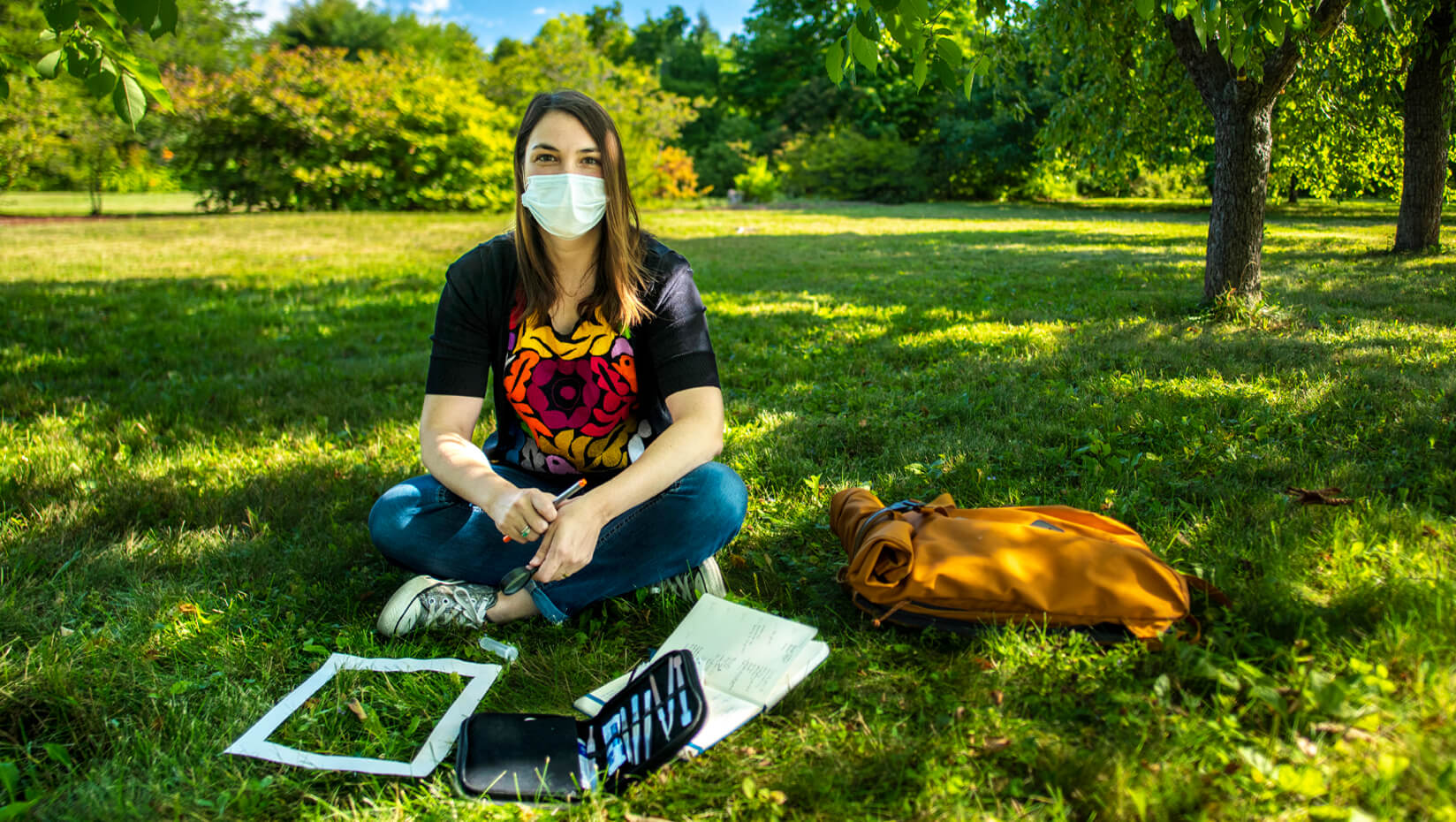
Biology lecturer adapts teaching to pandemic with outdoor lab fostering independent inquiry, classwide collaboration
The COVID-19 pandemic forced Julia McGuire to scrap the remaining labs for 200 BIO 100 students and create a new one within a week in March. Despite shifting to remote-instruction, she ensured students achieved their learning goals while fostering independent exploration and analysis in the spring 2020 semester.
And she’s taking that two-way learning experience into the fall.
The UMaine biology lecturer plans to enhance her lab instruction by offering a similar, more in-depth learning experience with greater collaboration and reflection.
McGuire coordinates classroom and lab teaching for the basic biology class, BIO 100, with instructors, teacher’s assistants and Maine Learning Assistants. She also coordinates BIO 200 — Biology of Organisms, with Farahad Dastoor, director of the School of Biology and Ecology.
The UMaine lecturer and her colleagues planned four large-scale labs for their spring BIO 100 students that required equipment and other supplies, the remainder of which were canceled in mid-March as a result of the pandemic.
“Immediately, I was overwhelmed. I care deeply that we provide our students with equitable access to learning, so I buckled down, and worked together with our BIO 100/200 team to come up with a plan to help our students reach the outcomes of the course,” McGuire says.
Like other UMaine faculty, McGuire reoriented lecture and lab work to suit a new remote learning environment. In response to the shift in classroom modality, McGuire, lab coordinator Rachel Fowler and teaching assistant Edna Pedraza developed an experiment that could be conducted anywhere.
The five-week lab tasked students — wherever they were sheltering in place, urban and rural settings from South Korea to Maine — with gathering observations, developing hypotheses, testing them, and analyzing and interpreting results.
Students began by recording the flora, fauna, their surroundings and the interactions between them — living and nonliving things, and environmental conditions — in a 50-pace straight line, or transect. McGuire says they could conduct their observations in a forest, along a city street, in their backyard or anywhere else. Students then had to make a focused prediction about what they expected to see over time, a testable hypothesis like seeing more plant and animal life overtime as spring temperatures warm.
After forming hypotheses, students investigated them by performing subsequent observations, which included quadrat sampling. They submitted presentations of their findings, supported with outside research and illustrated with graphs; and analysis and interpretations of the results.
Students achieved the learning objectives for the biology lab, while also posing well-developed questions and enjoying time outside, McGuire says. The experiment also advanced an ongoing effort among the School of Biology and Ecology faculty to implement inquiry-based instruction, which involves students tackling questions they pose themselves with individualized experiments that have unknown results.
“Honestly, it was a devastating time, but what came out of it was a course model that was flexible, but also engaging, active and fun,” McGuire said.
While instruction shifted to primarily online, asynchronous teaching in the spring, not all students have sufficient access to the internet. To compensate, McGuire used Google Forms and Google Documents to deliver and accept coursework, lab notes and final presentations. Students, she says, could access both programs anywhere on their phones or computers.
“There were other unanticipated challenges, such as students who couldn’t leave their houses due to immunocompromised family members, or students who were in quarantine in other countries,” McGuire says. “I came up with several adaptations for these situations that we will be able to use again this year.”
This fall, McGuire says she plans to have BIO 100 instructors host all classes and labs asynchronously online, allowing “flexibility in a well-supported consistent weekly structure that can be shifted if emergencies occur.”
The UMaine lecturer will reintroduce the spring experiment into the fall BIO lab, but at a much larger scale and with more collaboration. The project will span the entire semester, and include an interactive mapping tool showcasing all students’ data for comparison and answering questions. The lecture will compliment the lab with case-based learning to teach students the skills needed to conduct the lab.
Flexibility with greater focus on learning objectives than specific class plans will be key to providing successful online learning experiences, McGuire says.
“It is important to lead with compassion and empathy, and be communicative and flexible,” she says. “It is also important to be open and understanding of the diverse challenges that we are all facing.”
Contact: Marcus Wolf, marcus.wolf@maine.edu
